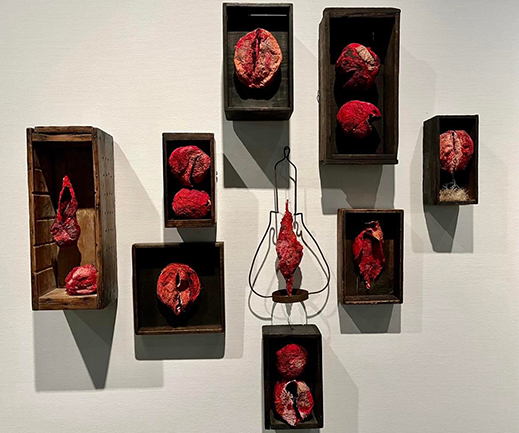 |
Focus features two in-depth reviews each month of fine art, architecture, and design exhibitions at art museums, galleries, and alternative spaces around Japan. |
|
|
 |
 |
 |
Accepting Entanglement: The Embroidered Creations of Junko Oki
Jennifer Pastore |
 |
New work in production, May 2022, artist collection, © 2022 Oki Junko; photo provided by The Museum of Modern Art, Kamakura & Hayama |
In the hands of the right artist, even the most mundane materials can take on beautiful, strange, and vivid forms. Junko Oki (b. 1963) uses a self-developed method of embroidery to produce works that seem at once organic and otherworldly. Their raw, corporeal aesthetic derives from a process of uncovering buried and unexplored terrain within her own heart and mind. Oki Junko: The Exposed at the Kamakura Annex of The Museum of Modern Art, Kamakura & Hayama is Oki's first solo show at a museum. Presenting early framed works, wall pieces, sculptures, and a new installation, the exhibition offers a comprehensive and compelling overview of the Kamakura-based artist's 13 years of practice.
Oki Junko: The Exposed installation view |
The following poem by the artist appears on a wall of the exhibition:
The Exposed
I am showing myself to myself
Even when ingrained notions and hesitancy get in the way
I reveal my insides
More and more, that is what I must do
Only the exposed is real
I show it in my seams, so that I do not spill it
What do I do this for?
I will express it in my stitching until I understand
(Translation from the Japanese by Jennifer Pastore)
|
Intertwine 1 (2021), artist collection
|
|
Lemon 1 (2021), private collection |
Oki embarked on her career as a fiber artist after inheriting a large quantity of thread from her late mother. She started out embroidering on clothes and bags, but before long moved to an abstract, textural style of freehand sewing on both sides of the fabric, rendering the stitching itself into works of art with sculptural dimensions. Often, her creations take on the appearance of living things or their by-products. They stretch, shrivel, burst, bleed, pucker, rot, spore, fester, scab, and molt. Possible interpretations of their forms include fruit peels, cobwebs, tree rings, mold, chrysalises, and wounds. Their colors are generally found in nature, ranging from deep reds and vibrant yellows to off-whites and subdued browns and greens. Oki works in cotton, silk, wool, linen, and hemp, while also sometimes incorporating materials and objects like paper, beeswax, pewter, bandages, and wooden frames. She will occasionally use an earlier work as the canvas for a new one, prompting reconsideration of what it means for a piece to truly be complete. She has referred to her own work as "my continually transforming skin."
 |
|
Installation of works from the series Sense and sweetness (2018) and Feeling unsaid and unspoken words (2019) |
Describing the title and inspiration for yoretsuremotsure, her recent show of new work at the Tokyo gallery Kosaku Kanechika (ended 19 November), Oki states: "Whatever I do, there are always tangles and places where the threads are taut or twisted. The word that came to me like some kind of secret code to describe this was 'yoretsuremotsure,' which is an amalgam of Japanese words expressing these traits. The thread gets tangled practically every time you stitch. However, securing the tangles in place instead of disentangling them brings an understanding that accepting entanglement is an important part of needlework."
This layering of old and new and a welcoming of "entanglements" seem paramount to the unique vitality of her work. Looking inward perhaps reveals that it's our entanglements that make us just what we are, giving us form and life.
Installation view with Moon and Chrysalis 08 (2017) in foreground; private collection |
All works shown are by Junko Oki; all photos are by Jennifer Pastore except where otherwise indicated.
|
 |
 |
Jennifer Pastore
Jennifer Pastore is a Tokyo-based art fan and translator. In addition to Artscape Japan, her words have appeared in ArtAsia Pacific, Sotheby's, and other publications. She served as editor at Tokyo Art Beat for seven years.
|
|
 |
|